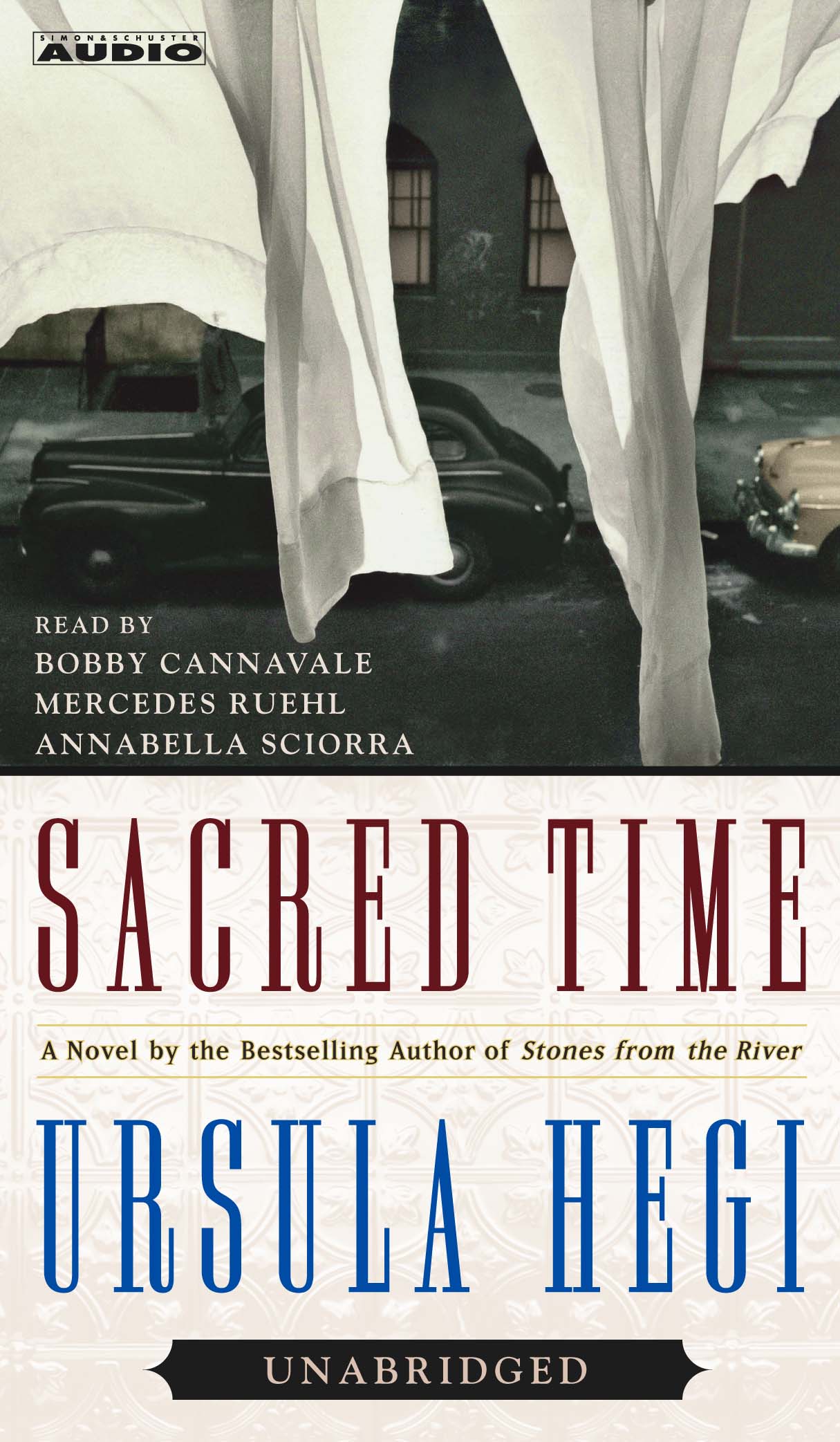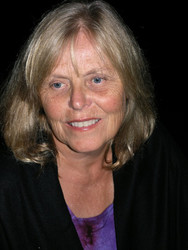Sacred Time
A Novel
By Ursula Hegi
Read by Annabella Sciorra, Mercedes Ruehl and Bobby Cannavale
Table of Contents
About The Book
The bestselling author of Stones From the River delivers her most ambitious and dramatic novel yet -- the unforgettable story of an endearing, but flawed, Italian American family.
In December 1953 Anthony Amedeo's world is nested in his Bronx neighborhood, his parent's Studebaker, the Paradise Theater, Yankee Stadium -- and in his imaginatin, where he longs for a stencil kit to decorate the windows like all the other kids on his street. Instead, he gets a very different present: his uncle Malcolm's family.
Malcolm is in jail for stealing -- once again -- from his latest new job, and Anthony's aunt and twin cousins settle into the Amedeos' fifth floor walk-up. Sharing a room with girls is excruciating for Anthony, despite his affinity for the twins. But the real change in Anthony's life comes one evening when he causes the unthinkable to happen, changing each family member's life forever.
Evoking all the plenty and optimism of postwar America, Sacred Time spans three generations, taking us from the Bronx of the 1950s to contemporary Brooklyn. Keenly observing the dark side of family -- and its gracefulness -- Hegi has outdone herself with this captivating novel about childhood's tenderness and the landscape of loneliness.
Hegi reveals how the transforming power of a singular event can reverberate through a family for generations.
In December 1953 Anthony Amedeo's world is nested in his Bronx neighborhood, his parent's Studebaker, the Paradise Theater, Yankee Stadium -- and in his imaginatin, where he longs for a stencil kit to decorate the windows like all the other kids on his street. Instead, he gets a very different present: his uncle Malcolm's family.
Malcolm is in jail for stealing -- once again -- from his latest new job, and Anthony's aunt and twin cousins settle into the Amedeos' fifth floor walk-up. Sharing a room with girls is excruciating for Anthony, despite his affinity for the twins. But the real change in Anthony's life comes one evening when he causes the unthinkable to happen, changing each family member's life forever.
Evoking all the plenty and optimism of postwar America, Sacred Time spans three generations, taking us from the Bronx of the 1950s to contemporary Brooklyn. Keenly observing the dark side of family -- and its gracefulness -- Hegi has outdone herself with this captivating novel about childhood's tenderness and the landscape of loneliness.
Hegi reveals how the transforming power of a singular event can reverberate through a family for generations.
Reading Group Guide
SACRED TIME by Ursula Hegi
Reader's Group Guide
At the core of Sacred Time lies a single, tragic event that transforms the lives of all its characters. How does Bianca's death impact each character? Can you envision how their lives might have been different had tragedy been averted?
As a boy, Anthony believes that men don't exist unless they are married. What leads him to this conclusion, and how does the idea continue to guide him, even as an adult?
Do you hold Anthony responsible for Bianca's death, as he does? What set in motion this awful sequence of events?
Anthony describes how his family tells stories "with great passion, listening with equally great passion while one of us would take one thread of a story and spin it along...." Why is it best when the stories are already familiar? How does Bianca's death affect the family stories?
How does Leonora both belong into the Amedeo family and remain isolated? Where does this distance come from?
Why does Leonora blame her inability to bring another child to term on her body's selfishness? How has her father's violent legacy shaped her?
The image of Leonora and Floria dancing reverberates throughout the novel. What does the dancing mean to Anthony? To his aunt and mother? To the men in the family? Where do you think the disconnect between Leonora and Victor lies? Were you surprised when they decided to get back together? Why do you think she decided not to restore the wedding photo from which she removed Victor?
Floria first uses the phrase "sacred time" on page 105. What do these words mean to her, and why do you think that the author chose them as the book's title?
What strength does Floria draw from her trip to Italy? What answers has she gone there to seek, and what meaning does she find?
Observing a family walking happily together from afar, Floria thinks, "Maybe that's what heaven was meant to be all along, that glimpse of someone you love being safe forever" (118). What makes this vision of heaven so compelling for Floria? What effect does the discovery that she completely misread the situation have on Floria -- and the reader?
How has the shadow of her sister's death shaped Belinda's life? Is it possible to read her marriage to Franklin -- shocking as it may initially seem -- as a return to the fold of her family?
As adults, Anthony and Belinda visit Bianca's grave together to bury a token of their childhood -- Bianca's onyx giraffe. Why is this act meaningful for each of them? What do you think it means that the earth "yields" to them (177)?
While Floria is dying, she revisits key moments in her life, holding her secrets up to the light. Why is it significant that no one is able to understand her? At the end, she muses: "She wishes she had more secrets, because the weight of all that was never brought forward has become so precious, so familiar, that to part with it would make her lighter yet" (211). What has made her secrets so important to her, and why does she cling to them now?
As a boy, Anthony decided that "if wanting anything as simple as a stencil kit could kill...I'd stop wanting altogether" (216). Is it possible to keep yourself from wanting? How has this lack of desire shaped Anthony's life -- his relationship with his family, his career, and his connection with his wife and son, in particular?
What significance does the story of Riptide and her husband's first encounter -- in which she saves him from drowning -- have for the novel as a whole? Has any other character chosen love over drowning?
Why has Leonora has waited so long to tell Anthony the truth about her father? How do you think this revelation will affect their relationship -- and what does the final scene suggest for their future?
Reader's Group Guide
At the core of Sacred Time lies a single, tragic event that transforms the lives of all its characters. How does Bianca's death impact each character? Can you envision how their lives might have been different had tragedy been averted?
As a boy, Anthony believes that men don't exist unless they are married. What leads him to this conclusion, and how does the idea continue to guide him, even as an adult?
Do you hold Anthony responsible for Bianca's death, as he does? What set in motion this awful sequence of events?
Anthony describes how his family tells stories "with great passion, listening with equally great passion while one of us would take one thread of a story and spin it along...." Why is it best when the stories are already familiar? How does Bianca's death affect the family stories?
How does Leonora both belong into the Amedeo family and remain isolated? Where does this distance come from?
Why does Leonora blame her inability to bring another child to term on her body's selfishness? How has her father's violent legacy shaped her?
The image of Leonora and Floria dancing reverberates throughout the novel. What does the dancing mean to Anthony? To his aunt and mother? To the men in the family? Where do you think the disconnect between Leonora and Victor lies? Were you surprised when they decided to get back together? Why do you think she decided not to restore the wedding photo from which she removed Victor?
Floria first uses the phrase "sacred time" on page 105. What do these words mean to her, and why do you think that the author chose them as the book's title?
What strength does Floria draw from her trip to Italy? What answers has she gone there to seek, and what meaning does she find?
Observing a family walking happily together from afar, Floria thinks, "Maybe that's what heaven was meant to be all along, that glimpse of someone you love being safe forever" (118). What makes this vision of heaven so compelling for Floria? What effect does the discovery that she completely misread the situation have on Floria -- and the reader?
How has the shadow of her sister's death shaped Belinda's life? Is it possible to read her marriage to Franklin -- shocking as it may initially seem -- as a return to the fold of her family?
As adults, Anthony and Belinda visit Bianca's grave together to bury a token of their childhood -- Bianca's onyx giraffe. Why is this act meaningful for each of them? What do you think it means that the earth "yields" to them (177)?
While Floria is dying, she revisits key moments in her life, holding her secrets up to the light. Why is it significant that no one is able to understand her? At the end, she muses: "She wishes she had more secrets, because the weight of all that was never brought forward has become so precious, so familiar, that to part with it would make her lighter yet" (211). What has made her secrets so important to her, and why does she cling to them now?
As a boy, Anthony decided that "if wanting anything as simple as a stencil kit could kill...I'd stop wanting altogether" (216). Is it possible to keep yourself from wanting? How has this lack of desire shaped Anthony's life -- his relationship with his family, his career, and his connection with his wife and son, in particular?
What significance does the story of Riptide and her husband's first encounter -- in which she saves him from drowning -- have for the novel as a whole? Has any other character chosen love over drowning?
Why has Leonora has waited so long to tell Anthony the truth about her father? How do you think this revelation will affect their relationship -- and what does the final scene suggest for their future?
About The Readers
Annabella Sciorra
Mercedes Ruehl
Bobby Cannavale
Product Details
- Publisher: Simon & Schuster Audio (December 1, 2003)
- Runtime: 9 hours
- ISBN13: 9780743549622
Resources and Downloads
High Resolution Images
- Book Cover Image (jpg): Sacred Time Unabridged Audio Download 9780743549622(0.2 MB)
- Author Photo (jpg): Ursula Hegi Photo Credit: Gordon Gagliano(0.6 MB)
Any use of an author photo must include its respective photo credit














